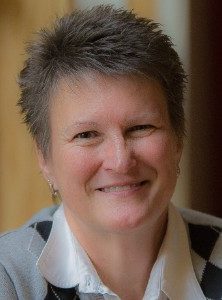I’ve had an interesting weekend. People on the Christian right have been emailing me to take issue with my BNG piece about white Christians and climate change. Unfortunately, they haven’t really engaged my arguments. They’ve mostly just called me names.
In 2015, when I was brand new to social media and blogging, I wrote a piece for Huffington Post titled “Mean Christians in the Digital Age.” In that essay, I expressed my (naive) shock at the vitriol coming my way from people who called themselves Christian.

Susan Shaw
Fast forward five years. I think it’s even worse.
I knew Christians could be mean. After all, I was at Southern Baptist Theological Seminary during the fundamentalist takeover of the Southern Baptist Convention. I witnessed Christian mean firsthand. And I taught religion at a Southern Baptist college where pastors and parents felt free to go directly to deans and presidents to accuse me of all kinds of things I didn’t say without even having the courtesy to talk to me directly. So I know mean Christians.
But social media and the Trump era have created a whole new level of immediate access, Fox News-misinformation, rightwing social media networks, and Christian mean.
In the past 24 hours, I have been called “ignorant fool, “moron,” “f**king stupid,” “brainless,” “loser” and “libtard idiot.” I also have been accused of “LGBT stupidity,” although I’m not sure if this is about the content I teach or the way some facet of being LGBT has made me stupid.
People have criticized my academic discipline of Women, Gender and Sexuality Studies, suggesting it doesn’t prepare students for the real world and won’t help them get a job and that I’d be better suited for pumping gas. I was told I “shouldn’t be allowed to teach a dog a trick, let alone teach young people in college” and that I had never had an original thought in my “pathetic life.”
Not surprisingly, a number of these writers have also questioned my Christian faith.
In an email with the subject line “Your Insane Racist Statement,” I was informed, “You just hate Christians and God obviously. With teachers like you, no wonder there are Antifa’s [sic] and others running around brainwashed burning and looting and attacking people.”
This made me think of something I saw on Facebook that another academic wrote: “I can’t brainwash students. I can’t even get them to read the syllabus.”
The email author went on: “People like you is [sic] what is causing the occasional church burning, and it will become more dangerous to go to church, some church services have had attacks in the last several years. Something should be done about teachers, professors that teach this racist hate against people of faith.”
And finally, perhaps the only true statement in her email: “None of this would have been allowed in the America I grew up in.”
To be clear, I’m not taking issue with difference of opinion rooted in arguments and evidence. These emails are nothing but ad hominem attacks, ranting, name-calling and meanness.
Further evidence: “You are the most most ignorant, idiotic, so called academic, bitch in the news today, and obviously incompetent to be associated with any university. You condemn Christians but teach the Bible. You are one confused a**hole.”
I’m really not sure what these writers hope to accomplish. Has anyone’s mind ever been changed by being called a “moron” or “stupid”? Do they want to hurt my feelings? Shame me? Make me stop writing?
“I think their motivation may arise from the same thing that drives many Trump supporters. They think ‘owning the libs’ makes them a winner.”
I think their motivation may arise from the same thing that drives many Trump supporters. They think “owning the libs” makes them a winner.
Taking the advice of Tibetan Buddhist Thich Nhat Han, I am trying to see their need to “own the libs” as a reflection of their suffering. He says if we recognize that hurtful behavior comes from suffering, we can maintain compassion for people who behave badly. Do their lives seem so small that they feel better, more powerful or smarter by insulting and belittling someone they don’t know? Do they feel such insecurity that they need to put a stranger in her place by criticizing her credentials, attacking her profession and discipline, questioning her students, and blaming her for a host of the world’s ill? How do they think being mean to me will alleviate their suffering? Do they find meaning in dashing off hateful words?
I remind myself that they, too, are beloved children of God, even though they are badly behaving ones.
These writers are strangers, and so to a great extent I can shrug off their vile words. Harder are the words of family and friends.
One Facebook friend posted a homophobic meme. I responded by explaining why it was hurtful to me, even as I suggested she had not intended to be hurtful. Did she apologize? No. She unfriended me.
My sister wrote a heartfelt and vulnerable post. A commenter told her she needed “professional help.”
Another Facebook friend told me I had drunk the liberal Kool Aid and needed to get right with God.
One Facebook friend, after watching the presidential debate, posted that Joe Biden is “too meek” to be president. Yet, the Bible tell us that the gifts of the Spirit are “love, joy, peace, longsuffering, gentleness, goodness, faith, meekness.” The meek, the Bible says, will inherit the earth. Moses was meek, above all men on the earth. Jesus referred to himself as meek. Yet I don’t think this Christian friend is alone in having come to believe meanness and cruelty, not meekness, are strength.
Yet he claims to follow someone who was crucified, someone who didn’t speak up in his own defense, someone who didn’t allow his disciples to fight back. (I know many Christians have embraced the “muscular Jesus” and a kind of Christian triumphalism that looks more like Trumpism than the faith of Jesus.)
Jesus’ strength was in his meekness, kindness and love, even in the face of unthinkable brutality. I am baffled that people who say they believe in the crucified Jesus embrace cruelty. They jump too quickly to the resurrection, but we can’t celebrate the resurrection without recognizing the barbarity of the cross. And if we take the cross seriously, we cannot claim to follow Jesus and participate in meanness and cruelty.
Yet we see so much cruelty among Christian Trump supporters. A Christian crowdfunding site raised hundreds of thousands of dollars to support the defense for the Kenosha, Wis., shooter who killed two Black Lives Matter protesters and injured another.
“This dismissal of expertise, facts and truths by people who call themselves Christian reflects the past four years of this administration’s undermining of credibility.”
Another Facebook friend posted that she didn’t want anyone to fact check her. We all have our own opinions, she said, and we can find opinion pieces and facts to support whatever we think. We do all have our own opinions, but all opinions are not created equal.
This dismissal of expertise, facts and truths by people who call themselves Christian reflects the past four years of this administration’s undermining of credibility through “alternative facts,” “fake news” and outright lies. For people who claim commitment to Truth, many Christians are quick to dismiss facts and truths that don’t line up with their worldview. They want to be free to post their distortions, misinformation and cruelties without any accountability.
And I know I haven’t been on the receiving end of the worst of all of this cruelty by a long shot. People have been trolled online, hounded at their workplaces, threatened for writing things some people don’t like. Yet I believe my experience reflects the degree to which some people have debased Christian faith by embracing the lies and cruelties of Trumpism.
There is no place for meanness and cruelty in Christianity. Dialogue, disagreement, debate, yes; but meanness, no. You can’t say you love God and treat your neighbor or your enemy cruelly.
I stand by my 2015 conclusion: Christian mean is still just plain mean.
Susan M. Shaw is professor of women, gender and sexuality studies at Oregon State University in Corvallis, Ore. She also is an ordained Baptist minister and holds master’s and doctoral degrees from Southern Baptist Theological Seminary. Her most recent book is Intersectional Theology: An Introductory Guide, co-authored with Grace Ji-Sun Kim.
Related articles:
Oregon is burning while most white Christians deny climate science


